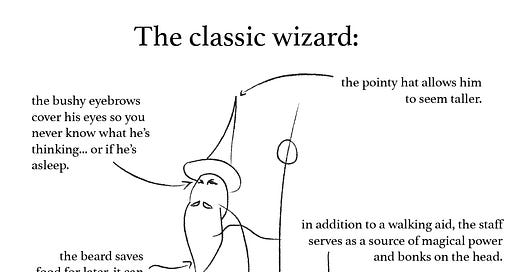What makes a wizard a wizard?
See the classic wizard: old, perhaps slumping, white, male, silvery beard. Robes. A hat, He murmurs. He goes by Merlin, by Gandalf, by Albus Dumbledore.
If he doesn’t murmur to himself, can he be a wizard? What if he isn’t old? What if he isn’t a man or chooses to be clean-shaven?
Etymology
wizard = wys + ard
The word wizard comes from the Middle English word wys, meaning “wise,” and the suffix -ard, connected to “hardy,” meaning “one who is hardy in.” In the early 15c., a “wizard” was a philosopher or a sage; someone hardy in wisdom. About 150 years later, the word wizard came closer to how we mean it today: “one hardy in magical power” or “one proficient in the occult sciences” (1). It’s a predictable next step: from “wise one” to “magical one;” how often in our lives do we encounter brilliant people whose genius is so dazzling it feels like magic?
With dangerous words like “wizen” floating around, it might be easy to assume that “wizen” borrows from wizard, or at least from wys or “wise.” It makes sense; idioms speak all the time about elders and this wisdom they’re supposed to have. So someone who is wizened is someone old, and who has through that oldness gained wisdom (or perhaps someone whose wisdom has aged them). Perfectly logical.
But “wizen” comes from wesanen, an Old High Germanic word that means “to dry up” or “to wither” (1). Also something that describes the elderly. So next time you call someone wizened, remember that you’re not calling them wise, you’re calling them shriveled.
So the word “wizard,” etymologically at least, means a wise person, who may or may not be shriveled – but the point is they don’t have to be.
Remember:
dictionaries – and etymologies – are descriptive, not proscriptive. They don’t tell us how words have to be used, they tell us how words tend to be used. Wizards tend to fit the description assigned above: they tend to be men who are shriveled and white and have beards. But they don’t have to be.
Next time we’ll look at some examples of “wizards.” You might find some of them really don’t fit the word.
By the way – why are we doing this? Fantasy and science fiction publications talk all the time about elevating historically underrepresented voices. I actually like to call them under-read voices and part of why they’re under-read is because people reading those voices don’t see them as belonging. That belonging starts to change when we look closer at the words we use.




